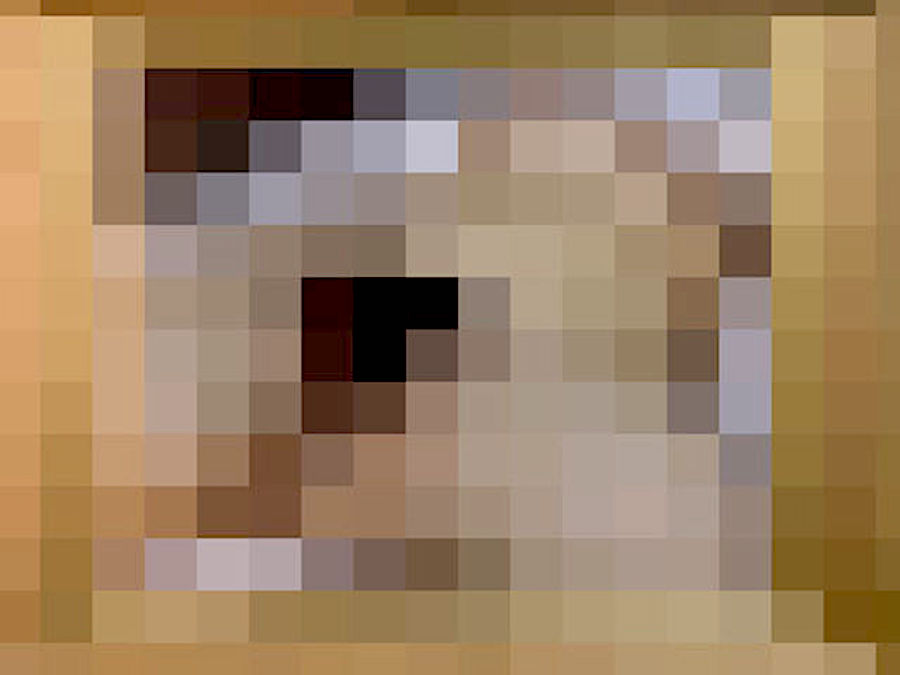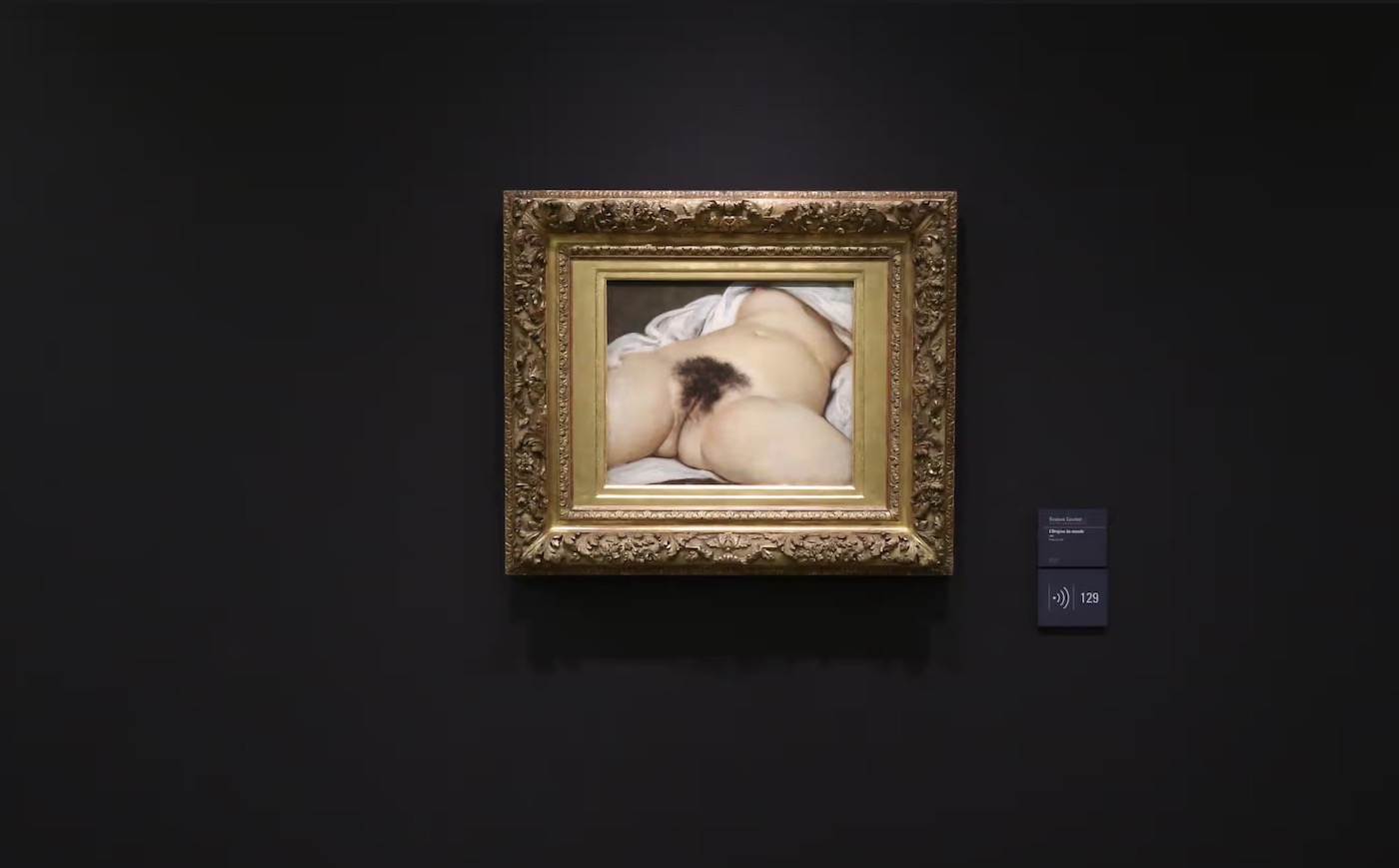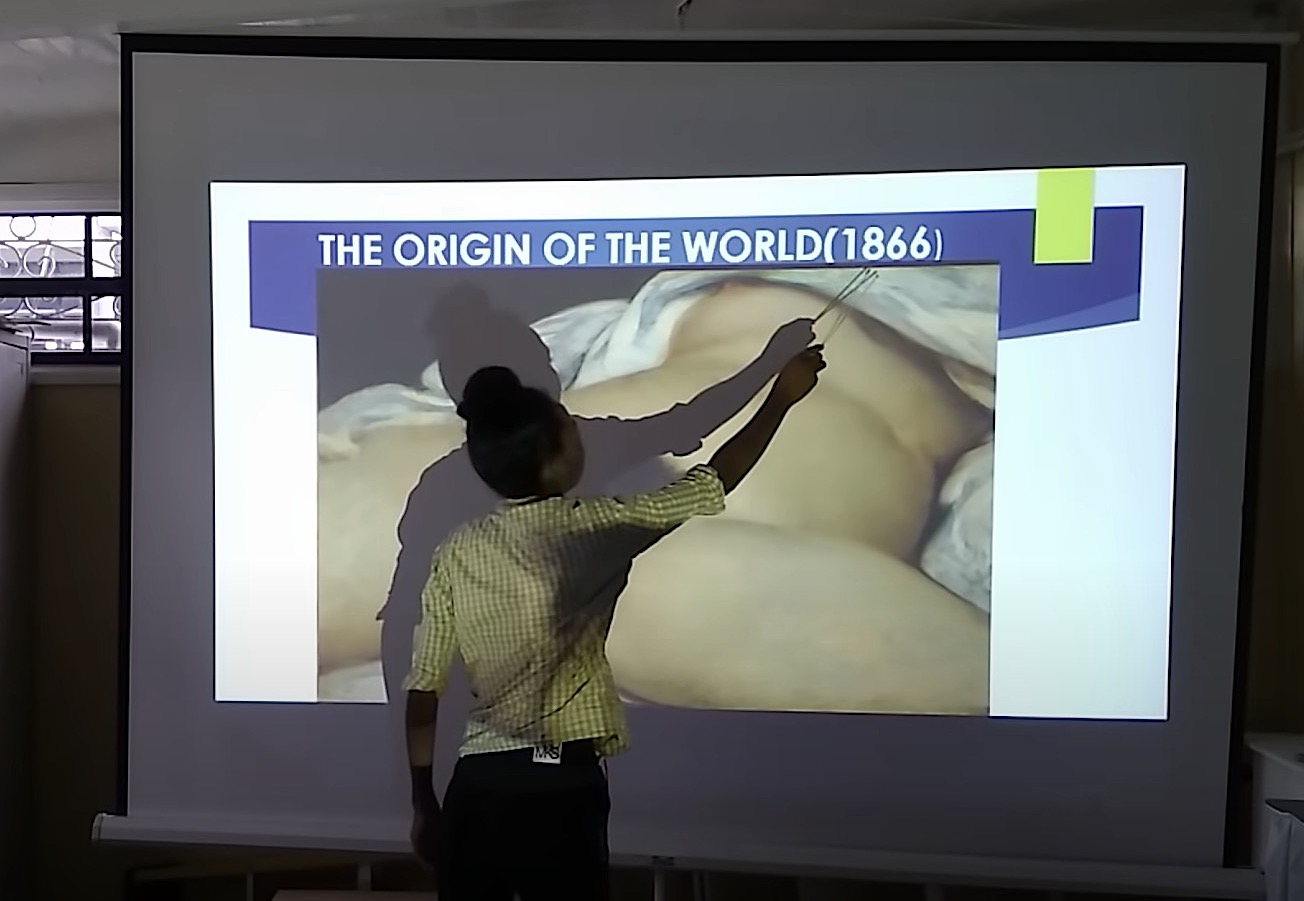Art Activists in Paris have defaced Gustave Courbet’s “The Origin of the World” (1866). The painting was at the centre of controversy yesterday at the Centre Pompidou-Metz.
Alongside Courbet’s work, several other artworks were marked with red paint spelling out “MeToo” inscriptions. An embroidered piece by Annette Messager was also brazenly snatched from its display.
Despite the tumult, Courbet’s provocative depiction of a vulva, on loan from the revered Musée d’Orsay, remained unscathed, shielded by a protective glass covering.

However, the same couldn’t be said for the surrounding pieces, which bore the crimson imprint of the protest. Deborah de Robertis, an artist at the heart of the commotion, revealed to reporters her role in orchestrating what she termed a “group performance” under the banner of “On ne sépare pas la femme de l’artiste” (You don’t separate the woman from the artist). Surveillance footage captured the moment two women emblasoned the words “MeToo” onto Courbet’s masterpiece and another by feminist artist Valie Export.
The protest extended beyond Courbet’s domain, targeting five pieces within an exhibit dedicated to the French psychoanalyst Jacques Lacan. Amidst chants of “MeToo,” participants skillfully diverted museum security’s attention, facilitating the act of protest.
Law enforcement swiftly responded, detaining two women at the scene. Meanwhile, Deborah de Robertis herself stands under suspicion of stealing Annette Messager’s red embroidered creation, “Je pense donc je suce” (I think, therefore I suck). Robertis, speaking to the AFP, defended the act as a “gesture of re-appropriation,” citing personal connections to a co-curator allegedly involved in past instances of sexual misconduct.
As details emerge, the narrative surrounding the protest art spectacle at Centre Pompidou-Metz unfolds, revealing a complex web of artistic expression, activism, and controversy.

The painting is known to attract controversy and widespread debate. In 2011, Facebook banned Courbet’s iconic painting from its platform. The 1866 artwork, renowned for its explicit depiction of female genitalia, has long been a subject of obscenity laws.
Facebook’s decision to censor Courbet’s masterpiece raised questions about the boundaries of artistic expression and censorship in the digital age. While the social media giant cited its community standards against nudity and explicit content as the reason for the ban, critics argue that the move stifles artistic freedom and cultural discourse.
After an extensive eight-year legal battle, Facebook settled a dispute with a French school teacher over sharing Courbet’s provocative painting. The artwork, renowned for its realistic portrayal of a woman’s genitals, sparked controversy when it was posted on the social media platform, leading to the suspension of a teacher’s account.
M. Durand took legal action in a Paris civil court, seeking to reactivate his Facebook account and €20,000 ($22,550) in damages. Facebook initially argued that all litigation should be handled in California court, per its user agreement. However, in 2015, a Parisian civil court ruled that France had jurisdiction in the matter, and a decision was upheld on appeal, allowing the case to proceed.
In March 2018, the court delivered its verdict, deeming Facebook’s suspension of Durand’s account unjustified. Nevertheless, it determined that since Durand could create a new account, he was not entitled to financial compensation. Despite this outcome, Durand had garnered approximately 800 followers on his original account, highlighting the significance of the dispute within the context of online censorship and artistic expression.
“The Origin of the World” is considered a seminal work in Courbet’s oeuvre. Its bold portrayal of female anatomy challenged societal norms and conventions. By banning the painting, Facebook silences an essential piece of art history and limits access to a significant cultural artefact.
The FB ban reignited discussions about social media platforms’ role in shaping public discourse and the extent to which they should regulate content. While Facebook has the right to enforce its community standards, many argue that the censorship of art, especially historical works like Courbet’s, sets a dangerous precedent and hinders the free exchange of ideas.
In response to the ban, artists, activists, and scholars have called for greater transparency and accountability from Facebook regarding its content moderation policies. They emphasize the importance of fostering open dialogue and protecting artistic expression, even when it challenges societal norms.
As the debate continues, one thing is clear: Facebook’s censorship of “The Origin of the World” raises important questions about the intersection of art, technology, and freedom of expression in the digital age.
Khalil Bey, an Ottoman diplomat and art collector, commissioned Courbet to paint the picture in the nineteenth century. Over the years, the painting has become a much-loved work of art and a symbol of the feminist movement.
The oil painting remained in private collections until it was acquired by the French psychoanalyst Jacques Lacan in the 1950s. In the 1980s, the painting was displayed at the Musée d’Orsay in Paris, where it attracted controversy and protests from feminist groups.
The artwork was eventually removed from public display and relegated to the museum’s reserve collection. In recent years, it has once again become the subject of controversy and debate. Some feminists argue that it is a powerful symbol of female sexuality and liberation, while others see it as objectifying and degrading women. Despite the controversy surrounding the painting, it remains an important work of art and artistic expression.

